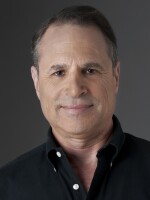Eight Republican voters — six of them undecided — gathered at NPR's request to watch the televised GOP presidential debate Tuesday night. NPR's Ted Robbins watched with them in Saddlebrooke, Ariz., a retirement community northwest of Tucson, and asked them to share their thoughts.
I thought I might be imposing on Dick and Peg Alford when I asked them to get some members of the Saddlebrooke Republican Club together at their house to watch the televised debate. But they thanked me for giving them an excuse to have a little midweek party. So, after food and drinks, the group of upscale retirees was ready for their assignment. As seven GOP contenders squared off in Las Vegas, the Alfords' house guests watched on two TVs — the men in one room and the women in another.
U.S. Rep. Michelle Bachmann scored points with the onlookers for saying that everyone, including the poor, should pay income taxes.
Texas Gov. Rick Perry lost points for supporting in-state tuition for Texas college students who are in the U.S. illegally.
Businessman Herman Cain got a big laugh from the group when he was asked if, because of their high profiles, either Perry or former Massachusetts Gov. Mitt Romney should be president. "I think I should be president," he said.
But after the debate, I wanted to know what stuck with these voters. What issues resonated with these former business people, ex-military and even government workers who retired to Arizona from all over the country?
A number of people, like Peg Alford — who owned a financial services company — agreed with every candidate's view that government should regulate business less in the belief that it will create more jobs.
"Interesting — all of us thought jobs was the most important," Alford said. "None of us work, but that doesn't mean we don't understand how important jobs are."
Gabriel Berczi liked Perry's plan to drill for more oil in the U.S.
"We don't send out for the oil, and it will provide employment with a domino effect that, once we start drilling, a whole industry will be built here that should have been built 25 years ago," Berczi said.
Marsha Isch said she's fed up with illegal immigration — a hot topic in Arizona — and thinks Perry is too soft on the issue.
"We used to live in Texas. I don't know that Perry has got it right," she said. "I think Romney would be a lot tougher. I don't know about Cain, either."
That's despite Cain's tough border talk, which included a remark about building an electrified fence along the Southern border. It isn't clear whether Cain is serious about that.
This group had no consensus on a debate winner. Nicole Stites said the most honest candidate doesn't stand a chance.
"The only candidate that didn't have anything to lose and was really speaking the truth was probably [U.S. Rep.] Ron Paul," Stites said. "The other ones were probably telling us what we want to hear, and I'm not sure they will come through with anything."
Dick Alford said the most conservative candidate should get the nomination, period: "I think we look for the person that is going to be best, and if they're the best, they're going to win."
That's "a good statement," Jeannette Berczi said, "but unfortunately, when you come to the bottom line, you need to vote for who is going to be able to take the presidency."
She said she likes former House Speaker Newt Gingrich's intellect, but she hasn't settled on anyone. Nicole and Mike Stites, on the other hand, seem to have made up their minds.
"Romney is definitely the one I would vote for right now if I had to go vote," Nicole said, with Mike adding that Romney "stands above the crowd."
For now, though, Peg Alford is happy with the whole field.
"Any one of them in my opinion would be a better candidate than the person we have right today in the White House," she said.
This group has four more months to decide before Arizona holds its primary. There will be plenty more debates to watch — and plenty more chances to get together for a neighborhood party.
Copyright 2022 NPR. To see more, visit https://www.npr.org. 9(MDAzMjM2NDYzMDEyMzc1Njk5NjAxNzY3OQ001))






